Researchers of the Month
May 2020
Here are just some of the graduating seniors we will miss. ... We wish them all well with their future endeavors and pursuits!
Jonathan Aminov - Biology major - Mentor: Dr. Christopher Clarke, Medicine
Ruben De Man- Biochemistry major- Mentors: Dr. David McKinnon, Neurobiology & Behavior; & Dr. Barbara Rosati, Physiology & Biophysics
Kiran Eiden - Physics and Astronomy major - Mentors: Dr. Michael Zingale, Physics & Astronomy; Dr. Yuefan Deng, Applied Math & Statistics; Dr. Jeffrey Heinz, Llinguistics
Ryan Helbock - Biomedical Engineering major - Mentor: Dr. Danny Bluestein, Biomedical Engineering
Makheni Jean-Pierre - Biology (interdisciplinary) major - Mentor: Dr. Pawan Kumar, MIcrobiology & Immunology
Yehonathan Litman - Computer Science major - Mentor: Dr. Ji Liu, Electrical & Computer Engineering
Delphine Mossman - Marine Vertebrate Biology , and Applied Math and Statistics majors - Mentor: Dr. Jeffrey Levinton, Ecology & Evolution
Nidhi Patel - Biology major - Mentor: Dr. Neta Dean, Biochemistry & Cell Biology
Sara Rosenquist - Psychology and Sociology majors - Mentor: Dr. Daniecl Klein, Psychology
Adrian Thompson - Biochemistry major - Mentor: Dr. Scott Laughlin, Chemistry
Elizabeth Varghese - Women’s, gender, and sexuality studies; and Biology majors - Mentor: Dr. Gurtej Singh, Surgery; Dr. Diana Garretto, Obstetrics & Gynecology
Elizabeth J. Varghese - Biology major - Mentor: Dr. Srinivas Pentyala, Anesthesiology
Jessica Vilas-Boas - Biochemistry major - Mentor: Dr. Markus Seeliger, Pharmacological Sciences
Jennifer Yang - Biology major - Mentor: Dr. Lucille London, Oral Biology & Pathology
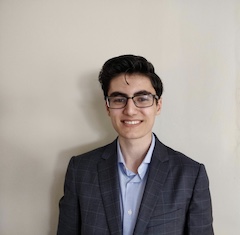 Jonathan Aminov is a Biology major who started doing research at the end of his freshman year under
the mentorship of Dr. Christopher Clarke in the Department of Medicine at Stony Brook
Medicine focusing on sphingolipids. He was a recipient of the 2019 URECA summer research
award. His project, titled “The Role of DES1 in Anoikis Resistance in IGF1R and EGFR Overexpressed Basal Breast
Cancer” is focused on the role of an enzyme, DES1, on the ability of cancer cells to resist
programmed cell death upon detaching from the extracellular matrix. He examined this
in conjunction with hyperactivation of receptor tyrosine kinases, EGFR and IGF1R that
have been linked to cancer metastasis in aggressive basal breast cancers. In addition
to research, Jonathan was a general chemistry teaching assistant currently serves
as an organic chemistry teaching assistant as well as an INSPIRE (Include New Students
through Peer Introduction to Research Experience) peer mentor. Jonathan plans to
apply to medical schools in the summer of 2020.
Jonathan Aminov is a Biology major who started doing research at the end of his freshman year under
the mentorship of Dr. Christopher Clarke in the Department of Medicine at Stony Brook
Medicine focusing on sphingolipids. He was a recipient of the 2019 URECA summer research
award. His project, titled “The Role of DES1 in Anoikis Resistance in IGF1R and EGFR Overexpressed Basal Breast
Cancer” is focused on the role of an enzyme, DES1, on the ability of cancer cells to resist
programmed cell death upon detaching from the extracellular matrix. He examined this
in conjunction with hyperactivation of receptor tyrosine kinases, EGFR and IGF1R that
have been linked to cancer metastasis in aggressive basal breast cancers. In addition
to research, Jonathan was a general chemistry teaching assistant currently serves
as an organic chemistry teaching assistant as well as an INSPIRE (Include New Students
through Peer Introduction to Research Experience) peer mentor. Jonathan plans to
apply to medical schools in the summer of 2020.
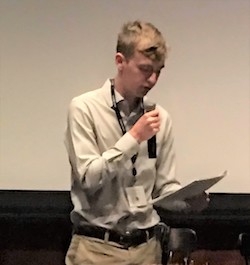 Ruben De Man is a senior Biochemistry major in the Honors College. His past research experiences
have included studies on radiation dose reduction limits in x-ray computed tomography,
imaging-based biomarkers for lung cancer progression, and machine learning for lesion
detection. Since then, Ruben has joined the laboratory of Dr. David McKinnon and Dr.
Barbara Rosati, where he employs a combination of functional MRI imaging and molecular
biology techniques to characterize the effects of chemotherapy on the brain vasculature.
He has presented his work at several international scientific meetings, including
the World Congress of Thoracic Imaging and IEEE International Engineering in Medicine
and Biology Conference. Ruben has received funding for his work from the Stony Brook
Institute for Molecular Cardiology and the URECA Program, and is a recipient of the
2020 Provost's Award for Academic Excellence.
Ruben De Man is a senior Biochemistry major in the Honors College. His past research experiences
have included studies on radiation dose reduction limits in x-ray computed tomography,
imaging-based biomarkers for lung cancer progression, and machine learning for lesion
detection. Since then, Ruben has joined the laboratory of Dr. David McKinnon and Dr.
Barbara Rosati, where he employs a combination of functional MRI imaging and molecular
biology techniques to characterize the effects of chemotherapy on the brain vasculature.
He has presented his work at several international scientific meetings, including
the World Congress of Thoracic Imaging and IEEE International Engineering in Medicine
and Biology Conference. Ruben has received funding for his work from the Stony Brook
Institute for Molecular Cardiology and the URECA Program, and is a recipient of the
2020 Provost's Award for Academic Excellence.
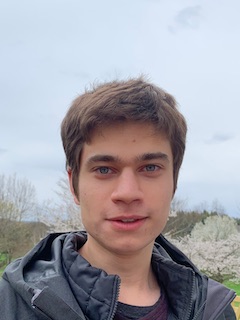 Kiran Eiden is a Physics and Astronomy major with minors in Computer Science and Mathematics
who has been involved in research since sophomore year, when he began working with
Dr. Michael Zingale and the nuclear astrophysics group at Stony Brook. His primary
project with the group revolves around Type I X-ray bursts, which are energetic nuclear
explosions on the surfaces of neutron stars. The goal of the project is to use numerical
simulations to investigate the physics underlying the explosion mechanism and connect
those insights to observable features of the bursts. This research has led to a publication
in The Astrophysical Journal, and Kiran presented it at the 235th meeting of the American Astronomical Society
in January 2020. He also spent the summer of 2019 doing computational astrophysics
research at Lawrence Berkeley National Laboratory, largely relating to radiation transport
and nuclear reactions in astrophysical plasmas. Outside of astrophysics, he has worked
with Dr. Yuefan Deng for a semester on a project for a NYC-based startup company.
He was part of a team tasked with designing a job scheduler rooted in machine learning
and optimized for a scalable computing cloud. Since the start of junior year, Kiran
has also been doing research with Dr. Jeffrey Heinz on a project in computational
linguistics. The aim of the project is to develop an efficient algorithm for learning
an abstract form of a translator from a dataset of valid input and output pairs. After
graduation, Kiran will be pursuing a PhD in Astrophysics at UC Berkeley and was awarded
a NSF-Graduate Research Fellowship (NSF-GRFP) and a Department of Energy Computational
Science Graduate Fellowship.
Kiran Eiden is a Physics and Astronomy major with minors in Computer Science and Mathematics
who has been involved in research since sophomore year, when he began working with
Dr. Michael Zingale and the nuclear astrophysics group at Stony Brook. His primary
project with the group revolves around Type I X-ray bursts, which are energetic nuclear
explosions on the surfaces of neutron stars. The goal of the project is to use numerical
simulations to investigate the physics underlying the explosion mechanism and connect
those insights to observable features of the bursts. This research has led to a publication
in The Astrophysical Journal, and Kiran presented it at the 235th meeting of the American Astronomical Society
in January 2020. He also spent the summer of 2019 doing computational astrophysics
research at Lawrence Berkeley National Laboratory, largely relating to radiation transport
and nuclear reactions in astrophysical plasmas. Outside of astrophysics, he has worked
with Dr. Yuefan Deng for a semester on a project for a NYC-based startup company.
He was part of a team tasked with designing a job scheduler rooted in machine learning
and optimized for a scalable computing cloud. Since the start of junior year, Kiran
has also been doing research with Dr. Jeffrey Heinz on a project in computational
linguistics. The aim of the project is to develop an efficient algorithm for learning
an abstract form of a translator from a dataset of valid input and output pairs. After
graduation, Kiran will be pursuing a PhD in Astrophysics at UC Berkeley and was awarded
a NSF-Graduate Research Fellowship (NSF-GRFP) and a Department of Energy Computational
Science Graduate Fellowship.
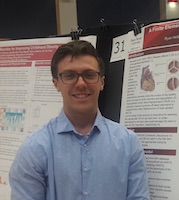
Ryan Helbock is a Biomedical Engineering major who will be continuing his education through Stony
Brook’s BME Graduate Program this upcoming Fall . He has worked under the mentorship
of Dr. Danny Bluestein for three semesters, and his research is focused on a procedure
called Transcatheter Aortic Valve Replacement (TAVR). Ryan has taken a focus on the
use of TAVR in Bicuspid Aortic Valve (BAV) patients and has conducted studies on TAVR
stent expansion and stress analysis within a patient-specific BAV anatomy. Ryan will
continue his research in Dr. Bluestein’s lab throughout graduate school, and plans
on designing a TAVR device dedicated specifically to BAV patients. Ryan has been a
member of the Stony Brook Baseball Club since 2017, and has interned at Omnitek Partners
for two and a half years. Ryan is a recipient of the 2020 Provost's Award for Academic
Excellence.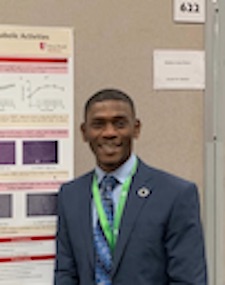
Makheni Jean-Pierre is an interdisciplinary biology student with a minor in French. His interest in research
developed after joining the Biology Partnership in Research and Education Program
(Bio-Prep) program at Stony Brook University in the summer of 2017: working in Dr.
Pawan Kumar’s lab, he investigated how Interleukin-17A signaling in the gut regulates
metabolic activities. He continued working on the project, after transferring to Stony
Brook University in the spring of 2018, and in summer 2018 developed his interest
in immunology through the Gateway to the Laboratory Program at Weill Cornell College
of Medicine while working in Dr. Nancy Du lab on the role of GENE-X in mediating Bcl-xL
promotion of Metastasis. In summer 2019, Makheni participated in a summer research
program at the University of Pennsylvania where he investigated the mechanism of X-chromosome
inactivation by Xist-RNA in quiescent and stimulated intestinal stem cells; a process
also shared by lymphocytes. This past year, Makheni was accepted to the nationally
competitive National Institutes of Health (NIH) Undergraduate Scholarship Program,
and will have the opportunity to gain additional research and professional development
experiences as an NIH research trainee after graduation.
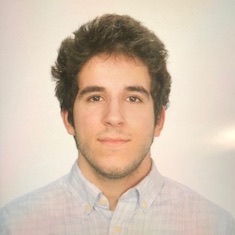
Yehonathan Litman is a senior Computer Science major with an Electrical Engineering Minor working with
Professor Ji Liu in the department of Electrical Engineering. His main research interests
involve building the algorithmic foundations for control and perception that robots
need in the real world, key to deploying perceptive robots that are effective in their
tasks and can be easily integrated into people's lives. He has done work in robotics
ranging from modular quadrotor swarms, to low-power visual inertial sensing, to human
detection and tracking. Yehonathan is also a University Scholar and has presented
his research at the annual URECA symposium as well as other conferences held by the
IEEE and NSF. He did work for DARPA and other institutions such as Lehigh University
and the University of Pennsylvania. He plans to pursue an MS in Robotics at Carnegie
Mellon University in the fall of 2020 and continue to a PhD. Yehonathan is a recipient
of the 2020 Provost's Award for Academic Excellence.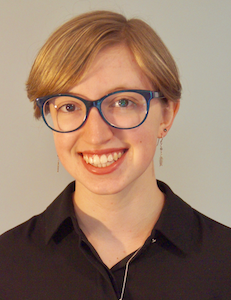
Delphine Mossman is a Marine Vertebrate Biology and Applied Math and Statistics double major. During her time at Stony Brook University, she assisted with research in the Bradley Peterson lab at the Southampton campus, and the Janet Nye lab at the West campus. Her Honors College thesis examined the current state of Pacific salmon populations and contrasted it with their presented state in the 1999 book Song for the Blue Ocean, by Dr. Carl Safina. She will be attending the University of New Brunswick, in Canada, in the fall to pursue a Master of Science in biology. Working in Dr. Kimberley Davies' lab, her project will involve using autonomous gliders to monitor endangered North Atlantic right whales and their prey, in order to better predict their location in real time and therefore help implement flexible conservation measures. She is a recipient of the Provost Award for Academic Excellence, and is graduating summa cum laude.
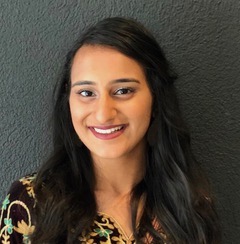 Nidhi Patel is a Biology major and South Asian Studies minor. Under the mentorship of Dr. Neta
Dean, her research is focused on the analysis of post-translational protein modifications
in the secretory pathway of the non-pathogenic budding yeast Saccharomyces cerevisiae
and the human pathogenic yeast, Candida albicans. Nidhi currently investigates purification schemes for the secreted protein in significant
quantities to define the novel modification pathway in C.albicans through further biochemical and structural analyses. She has performed immunoprecipitations
of secreted HA tagged proteins with Protein A-sepharose, Nickel-NTA agarose chromatography
columns, and Western blots. Through research, she has become an INSPIRE mentor, speaking
to students about research opportunities, and ways to balance and time-manage their
undergraduate experience. When she is not in the lab, Nidhi is a student leader on
campus, serving as president of Hindu Students Council, and previous treasurer and
member of the folk dance team SBU Raaswalas. She is currently an Academic Associate
intern performing clinical research in the SBU Hospital Emergency Department. In the
past, she has worked as an Undergraduate Teaching Assistant for the classes BIO 201
and AAS/POL 338 and became a mentor for students. After graduation, she will be taking
a gap year to continue clinical and lab research before pursuing medical school.
Nidhi Patel is a Biology major and South Asian Studies minor. Under the mentorship of Dr. Neta
Dean, her research is focused on the analysis of post-translational protein modifications
in the secretory pathway of the non-pathogenic budding yeast Saccharomyces cerevisiae
and the human pathogenic yeast, Candida albicans. Nidhi currently investigates purification schemes for the secreted protein in significant
quantities to define the novel modification pathway in C.albicans through further biochemical and structural analyses. She has performed immunoprecipitations
of secreted HA tagged proteins with Protein A-sepharose, Nickel-NTA agarose chromatography
columns, and Western blots. Through research, she has become an INSPIRE mentor, speaking
to students about research opportunities, and ways to balance and time-manage their
undergraduate experience. When she is not in the lab, Nidhi is a student leader on
campus, serving as president of Hindu Students Council, and previous treasurer and
member of the folk dance team SBU Raaswalas. She is currently an Academic Associate
intern performing clinical research in the SBU Hospital Emergency Department. In the
past, she has worked as an Undergraduate Teaching Assistant for the classes BIO 201
and AAS/POL 338 and became a mentor for students. After graduation, she will be taking
a gap year to continue clinical and lab research before pursuing medical school.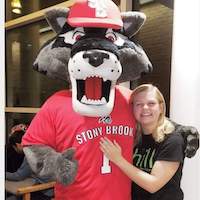
Sara Rosenquist is a Psychology-Sociology double major with a minor in Philosophy and has been involved
in research since March 2018. She worked in Dr. Johanna Jarcho’s Social Developmental
Neuropsychology Lab, and then transitioned to Dr. Daniel Klein’s Psychopathology Lab
in August 2018. Sara’s research interests include conceptualizing psychological resilience,
stress appraisal, and identifying early neurological risk factors for psychopathological
and functional outcomes. Her honors project samples a subset of participants involved
in her lab’s larger longitudinal study, “The Stony Brook Temperament Study”. The project
aims to identify the impact of measured stress on late positive potential (LPP) reactivity
in early childhood and functional outcome patterns observed during adolescence. In
addition to research involvement, Sara has been a liaison between the student body
and campus resources relating to physical and mental health as a CHILL Peer Health
Educator and Program Assistant during her sophomore and junior years. She also currently
serves as a Psychology Peer Mentor and has gained over 200 hours of experience as
a crisis counselor. Sara will pursue her PsyD in Clinical Psychology at Midwestern
University in Fall 2020.
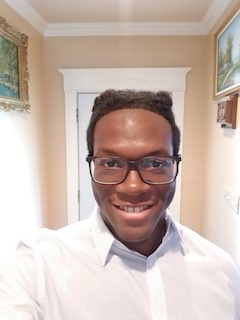 Adrian Thompson is Biochemistry major on the pre-medical track who began doing research in chemical biology
and neuroscience with the Laughlin Lab in summer 2018. The project Adrian is involved
in aims to develop the small molecule novel spirocyclopropene family of tracers that
couples modern biological techniques with chemical synthesis to control the visualization
of biological systems with respect to both space and time. When selectively uncaged
by either light or enzymatic-cleavage, the spirocyclopropene molecule undergoes a
reaction with the tetrazine-quenched fluorophore via an inverse demand Diels-Alder
(iEDDA) reaction, enabling the visualization of biological systems, such as the neural
connections in the olfactory system of the larval zebrafish. Adrian has presented
the synthesis of these molecules at Stony Brook University’s Department of Chemistry’s
Diamond Jubilee in 2018; and last year was a recipient of the 2019 URECA research
grant award. His poster for the 2020 URECA virtual poster symposium, titled “Synthesis
of Enzyme-Cleavable Spirocyclopropene for Spatiotemporal Imaging in Live Cells”, introduces
the chemical synthesis of the spirocyclopropene scaffold and two different enzyme-cleavable
caging groups. Through development and testing of additional enzyme-cleavable cages,
Adrian’s work has contributed to the project’s mission of increasing the various applications
and functions of this family of novel molecular tracers. Working under Ph.D candidate
Ting Jiang, he has been listed as a co-author of “Modular Enzyme‐ and Light‐Based
Activation of Cyclopropene–Tetrazine Ligation.” published in 2019 in the ChemBioChem
journal.
Adrian Thompson is Biochemistry major on the pre-medical track who began doing research in chemical biology
and neuroscience with the Laughlin Lab in summer 2018. The project Adrian is involved
in aims to develop the small molecule novel spirocyclopropene family of tracers that
couples modern biological techniques with chemical synthesis to control the visualization
of biological systems with respect to both space and time. When selectively uncaged
by either light or enzymatic-cleavage, the spirocyclopropene molecule undergoes a
reaction with the tetrazine-quenched fluorophore via an inverse demand Diels-Alder
(iEDDA) reaction, enabling the visualization of biological systems, such as the neural
connections in the olfactory system of the larval zebrafish. Adrian has presented
the synthesis of these molecules at Stony Brook University’s Department of Chemistry’s
Diamond Jubilee in 2018; and last year was a recipient of the 2019 URECA research
grant award. His poster for the 2020 URECA virtual poster symposium, titled “Synthesis
of Enzyme-Cleavable Spirocyclopropene for Spatiotemporal Imaging in Live Cells”, introduces
the chemical synthesis of the spirocyclopropene scaffold and two different enzyme-cleavable
caging groups. Through development and testing of additional enzyme-cleavable cages,
Adrian’s work has contributed to the project’s mission of increasing the various applications
and functions of this family of novel molecular tracers. Working under Ph.D candidate
Ting Jiang, he has been listed as a co-author of “Modular Enzyme‐ and Light‐Based
Activation of Cyclopropene–Tetrazine Ligation.” published in 2019 in the ChemBioChem
journal. Elizabeth Varghese is a WISE Honors student double majoring in biology and women’s, gender, and sexuality
studies, who started doing research at Stony Brook as a high school student through
the Simons Summer Research program. She is currently working in the Department of
Obstetrics and Gynecology on the influence of intrapartum events on patient understanding
in labor, as well as vitamin D prophylaxis in the prevention of hypertensive disorders
of pregnancy. Elizabeth has presented her work at national conferences, including
the 2020 American Medical Women’s Association Virtual Leadership Development Conference
for Women Physicians and the 2020 American College of Obstetrics and Gynecology Annual
Meeting. Prior to her work in the Department of Ob/Gyn, Elizabeth worked in the Department
of Vascular Surgery studying tissue-engineered vascular grafts, their use in vascular
and reconstructive surgeries, and their mechanical and biological properties. Her
summer work on “Tissue Engineered Vascular Graft for Use in Vascular and Reconstructive
Surgeries” culminated in being selected for a talk at the Biomedical Engineering Society
annual conference in Phoenix, Arizona in October 2017. Elizabeth was recently inducted
into Phi Beta Kappa and was awarded the 2020 Provost’s Award for Academic Excellence.
She will be an MD/MPH candidate at the Renaissance School of Medicine at Stony Brook
University this fall.
Elizabeth Varghese is a WISE Honors student double majoring in biology and women’s, gender, and sexuality
studies, who started doing research at Stony Brook as a high school student through
the Simons Summer Research program. She is currently working in the Department of
Obstetrics and Gynecology on the influence of intrapartum events on patient understanding
in labor, as well as vitamin D prophylaxis in the prevention of hypertensive disorders
of pregnancy. Elizabeth has presented her work at national conferences, including
the 2020 American Medical Women’s Association Virtual Leadership Development Conference
for Women Physicians and the 2020 American College of Obstetrics and Gynecology Annual
Meeting. Prior to her work in the Department of Ob/Gyn, Elizabeth worked in the Department
of Vascular Surgery studying tissue-engineered vascular grafts, their use in vascular
and reconstructive surgeries, and their mechanical and biological properties. Her
summer work on “Tissue Engineered Vascular Graft for Use in Vascular and Reconstructive
Surgeries” culminated in being selected for a talk at the Biomedical Engineering Society
annual conference in Phoenix, Arizona in October 2017. Elizabeth was recently inducted
into Phi Beta Kappa and was awarded the 2020 Provost’s Award for Academic Excellence.
She will be an MD/MPH candidate at the Renaissance School of Medicine at Stony Brook
University this fall.

Elizabeth J. Varghese is a Biology major who started doing research the fall of her sophomore year under
the mentorship of Dr. Srinivas Pentyala in the Department of Anesthesiology. Elizabeth
has been part of many research projects while working with Dr. Pentyala, focusing
on the project, "Rapid Gout Detection Method and Kit," which discusses the development
of a kit to diagnose gouty arthritis bed-side. Elizabeth uses the skills she developed
from Dr. Pentyala's lab in other research settings, having the opportunity to apprentice
at Pfizer Inc. in the summer of 2019. During her time at Pfizer, Elizabeth was able
to analyze the structure of the drug Vydaquel (tafamidis) for the treatment of ATTR-Cardiomyopathy.
Elizabeth is also a member of Stony Brook Rowing (serving as Secretary from 2017-20190,
and previously of Stony Brook Young Investigators Review. She has presented at the
American Association of Physicians Research Competition (November 2019) as well as
the virtual URECA poster symposium. Following graduation, Elizabeth plans on working
as a research assistant during her gap year before attending graduate school to pursue
research in physiology.
Jessica Vilas-Boasis a biochemistry major researching a novel series of inhibitors related to FDA-approved
leukemia drugs in the Department of Pharmacology in the laboratory of Dr. Markus Seeliger.
She is a member of the President’s Council of Student Advisors, the Women’s Leadership
Council, CSTEP Advisory Board, WISE and is a recipient of the Chancellor's Award for
Student Excellence. A Studio Art minor, Jessica has work displayed in the Frank Melville
Jr. Memorial Library and Sunwood Estate. Jessica participated in the Gerstner Sloan
Kettering Summer Undergraduate Research Program in summer 2019, and plans to pursue
PhD studies in structural biology.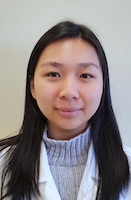
Jennifer Yang is a Biology major with a minor in Digital Arts in the Honors College. In her freshman
and sophomore years, she participated in research under Dr. Basil Rigas of the Division
of Cancer Prevention, studying novel drug pharmacokinetics in inflammatory eye diseases.
In the past 2 years, she has worked with Dr. Lucille London in Oral Biology and Pathology,
where she has conducted research in the role of the parotid gland in mucosal immunology.
She has presented this research in the 2019 International Association of Dental Research
Conference. She was also a recipient of the 2019 URECA summer research award and the
URECA Travel award. She was accepted to present her research in the 2020 International
Association of Dental Research where she was chosen as one of 9 participants to compete
in the Junior Division of the Hatton Competition. After graduation, Jennifer will
be attending Renaissance School of Medicine, where she will be pursuing her MD.
Karen.How has research prepared you for your future career?
Elizabeth. Research has given me insight into the inner workings of potential fields I may work in as a physician, as well as what a career in academic medicine may look like. Ultimately, it has taught me to think critically and understand that science is very much subject to biases that must be accounted for and studied, as much as many of us want to accept everything we read in journals as fact.Elizabeth J. While participating in undergraduate research, I have had the opportunity to practice technical lab skills, as well as critical thinking techniques - an essential attribute for any scientist. Working in the lab setting has granted me the confidence to ask the right questions and work strategically to finding an answer. Doing research has provided me with countless learning experiences which I hope to apply when earning my Ph.D.
Karen. What's your favorite aspect of doing research?
Ruben. One of the most exciting aspects of medical research is the emphasis on translation of scientific findings directly into clinical practice. It is immensely rewarding to contribute to the body of basic science knowledge that informs clinical breakthroughs.
Makheni. My favorite aspect of doing research is that it enables me to think critically and thoughtfully plan and conduct experiments. My research experience has helped me think beyond simply following protocols by making me evaluate how to address the underlying questions the research is based on. These underlying questions are not only applicable to what I do in the lab but also to my everyday life. The best aspect of doing research is that I discovered myself and I enjoy it.
Karen. How did being involved in research enhance your education?
Nidhi. When I first started research, I didn’t even know how to hold a pipette. Now I can perform immunoprecipitations and western blots without looking at the protocol.
Research has given me hands-on experience to understand what is taught in the classroom. It has taught me that failure is inevitable in a learning process, but also that resilience in any task you wish to accomplish is imperative. In terms of interpersonal interaction, it has taught me how to explain my scientific findings using simple words, communicate with my mentor and peers, and even mentor new students about procedures and theories in the lab. These communication and life skills are invaluable in any field of work in the future.
Ryan. Involvement in research has provided me with experience in my field of interest that I otherwise would not have been exposed to. Not only have I learned a great deal of information from my coursework, but my education has been enhanced through research by learning how to apply that information to develop solutions to real-life problems. This direct exposure to my field of interest will prepare me well for entering the job market.
Karen. What advice about research do you have for other students?
Yehonathan. If you want to be a successful researcher and have plans for graduate schools, make as many connections as possible and make the best impression you can in your work. Building your reputation is incredibly important, as it will make other researchers trust you more, give you more intellectually challenging work, and support you in your future endeavors.
Delphine. Don't underestimate the impact of the small stuff! Even though my assistance in the Peterson and Nye labs was mostly helping with setup/recording of experiments and data analysis, I still got the chance to talk with the graduate students about their work, which was a valuable experience when figuring out my post-graduation plans.
Sara. Research experience is often crucial to many careers paths in psychology. It put me at an advantage when applying to graduate programs despite my decision to pursue a degree specializing in practice. Even if you're not research-oriented it is possible to find the right lab with the right opportunities that suit you - you just need to find it!
Jonathan. Don't be afraid to ask professors about research even if you do not know them. Make connections with your professors in class but also reach out to those you don't know. If research is truly your passion, don't hesitate to take that chance and email a professor whose research interests you even if you have not taken a class with them. Conducting research is an amazing opportunity to learn new skills and grow personally and professionally so don't be afraid to take a chance.
Jessica. Always think about the bigger picture in terms of your project motivation. You're not just running a gel or using PCR for the purpose of utilizing step-by-step techniques. The technique is merely a tool to help get you to your overall project goal and balancing the two concepts (technique and utility to reach goal) is essential in understanding your project.
Adrian. I would advise other undergraduate researchers to not be afraid to ask questions. By asking questions and showing initiative in your research project, you will have more opportunities to learn from the experienced people in your lab and grow your own abilities by learning new skills. This will help you make the most of your research experience and place you in a great position to make important contributions to the project.
Kiran. My advice would be to get involved in research early, especially if you are interested in going to graduate school. It may be daunting to put yourself out there and talk to a professor about it, and it could take time to find a research group that is a good fit for you, but if you do it can be an immensely rewarding experience. Even if you find that you don't care for a particular field or research project, it can help you decide what career path you may want to pursue. The opportunity to become involved in research is one of the main benefits of being at a major research university, and it is well worth taking advantage of.
